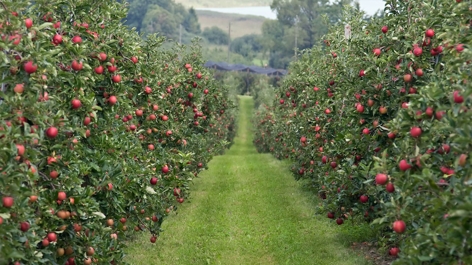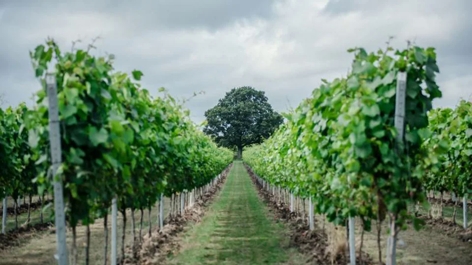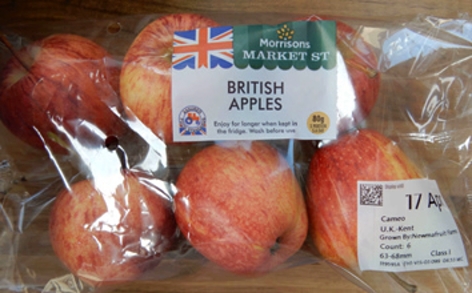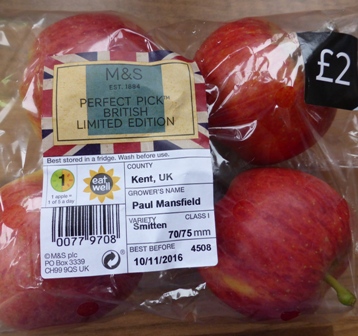

WAPA
The World Apple and Pear Association (WAPA) presented its 2024-25 projections during the 2024 Prognosfruit conference in Budapest, Hungary. The organization is forecasting an 11.3% decline in European apple production, while pear volumes are expected to show a slight recovery, increasing by nearly 5%.
About Prognosfruit
Prognosfruit is the world's leading annual event for the fruit industry. At this conference, the World Apple and Pear Association (WAPA) announces the apple and pear production forecast, and fruit market trends in the EU and outside are discussed. The conference brings together producers, processors and traders from various European countries and beyond.
In 2024, the apple production in the EU for the top producing countries contributing to this report is estimated to decrease by 11,3% compared to last year. This year's crop is also 13,6% below the average of the previous 3 years.
The Prognosfruit Conference is Europe's leading annual event for the apple and pear sector, gathering apple and pear experts from across Europe and beyond. Prognosfruit 2024 took place last week in Budapest, Hungary.
During the conference, WAPA released its forecast for the upcoming season of 2024/2025. The forecast for apples is set at 10.2 million tonnes, 11,3% lower than last year. The pear crop shows a slight recovery from 2023, increasing by 4.9% to 1.79 million tonnes.
The Central and Eastern regions of the European Union were heavily impacted by poor blossoming, late frost, and hail, leading to lower crop yields in Poland, Hungary, the Czech Republic, and Austria. This is expected to result in a reduced supply for apple processing in the 2024-25 season.
This year's apple crop is also 13.6% below the average of the previous three years, the report stated. However, WAPA noted that the season's overall outlook remains positive, with potential opportunities for better returns for a sector still grappling with the challenges of inflation and rising costs in recent months.
 The outlook for the season is overall positive and should provide opportunities for better returns for the sector, which still faces the challenges of inflation and rising costs of the past months.
The outlook for the season is overall positive and should provide opportunities for better returns for the sector, which still faces the challenges of inflation and rising costs of the past months.
Europe's increasingly unsettled climate continues to cause a decline in apple yields, particularly in the eastern part of the continent, it has emerged.
The EU is on course to produce its smallest apple crop in seven years, and its second-smallest in a decade, at just over 10.2 million tonnes this season.
It is anticipated the EU's total apple volume for the fresh market would be significantly lower at around 6.3m tonnes, with 1.7m tonnes from eastern Europe and 4.6m tonnes from western Europe.
But in the latter part of the continent, it is predicted, production will be 22 per cent down in northern countries like Germany, and 1 per cent up in southern countries such as Italy.
"This makes it very interesting for western Europe," it was observed. "The average euro price per 100g could possibly be higher at around 75-90 euros." (In Europe!)
The English Apple Man comments:
"My regular readers will be well aware of the current situation for British Apple (& Pear) Growers. Since the 'COVID Pandemic' and the War (sorry Mr Putin but it IS a War) and the rampant inflation our fruit growers (soft fruit as well) have been having a torrid time"!
Climate change is also part of the equation: "temperatures in southern France are consistently reaching 40 degrees C in summer and speculation that large areas (there is a lot) will switch from apples to citrus production. Spain is even hotter and while breeders are attempting to create 'hot climate' apples with more resistance to the blazing sun, again apple production is likely to be affected!
 With the torrid summers of 2002, the fruit-growing sector in Catalonia began to see with concern how it was becoming increasingly difficult to achieve optimum quality in terms of colour, texture and aroma for the different varieties of apple and pear. Regularity, climatic variation and a certain intensity of cold weather are necessary for these fruits. This led to the creation of the Hot Climate Partnership, the world's only varietal improvement programme designed to meet the challenge of producing quality apples and pears in hot climates.
With the torrid summers of 2002, the fruit-growing sector in Catalonia began to see with concern how it was becoming increasingly difficult to achieve optimum quality in terms of colour, texture and aroma for the different varieties of apple and pear. Regularity, climatic variation and a certain intensity of cold weather are necessary for these fruits. This led to the creation of the Hot Climate Partnership, the world's only varietal improvement programme designed to meet the challenge of producing quality apples and pears in hot climates.
Click on: Hot Climate Apple Breeding
As a result of global influence, commercial pressures, not to mention the weather (always a challenge) many growers, Apple growers and soft fruit growers are 'throwing the towel in' while they can, before the bank manager intervenes.
So what are the consequences of pressures on British and European growers?
In the last 10 years (circa) any shortage of apples and pears (especially apples) in the UK has allowed retailers the opportunity to 'buy produce from abroad' however, the impact on European growers, who have also grubbed a lot of top fruit (Apples & Pears) and the decreasing number of UK growers will surely impact on availability!
 Interestingly as I drove to Canterbury this week from my home in East Sussex, I passed many fields which were previously apple orchards for generations but are now part of the large areas now committed to Viticulture.
Interestingly as I drove to Canterbury this week from my home in East Sussex, I passed many fields which were previously apple orchards for generations but are now part of the large areas now committed to Viticulture.
British Apples and Pears (BAPL) reports:
Young apples are now growing and ripening slowly in orchards across the UK. Growers have been reviewing their crops closely and have set out the following predictions for the coming 2024 British apple season:
Apples will be larger than average. The mild weather during March and April this year is resulting in larger apples. This will mean that the price per pack will need to increase, or retailers should look to put more four packs on the shelf, as consumers will be getting more 'apple' in their six-packs than in previous years.
Below: left. typical 6 pack of apples and right. a 4 pack which may be more prevalent tis season


Growers will be talking to their retail customers about this natural reality to ensure that they receive a fair return for the weight of apples they are producing.
Apple volumes are generally looking good. While variations from orchard to orchard exist, the overall apple crop is looking reasonable. Expectations are that it will be slightly larger than in 2023, but not as big as 2022.
Some skin blemishes, but great eating experiences. This year's crop may not be picture perfect, but the eating experience will be as delicious as always. Some orchards have experienced hail damage and there is a low level of russeting in some locations due to the spring weather. This will result in blemishes on the skin of the fruit.
What is important is that this does not result in food waste. The eating experience is the same and these apples are just as delicious as usual.
![]() That is all for this week
That is all for this week
Take care
The English Apple Man